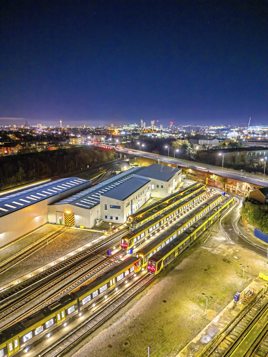The opening of a new railway station is always cause for celebration, no matter where the station may be.
But often, new stations tend only to be of local importance - rarely (if ever) do they have the potential to reshape parts of the wider rail network.
However, the Headbolt Lane station in Knowsley promises to be an exception - fitting the criteria of a station of national importance.
The station itself may be relatively modest, but the fact that it is being served by battery-powered trains (a UK first), potentially makes it hugely significant.
Merseyrail’s new Class 777/1 IPEMUs (independently powered electric multiple units) have enabled Merseyrail to expand its network for the first time since the Wirral lines to Chester and Ellesmere Port were electrified.
Since then, Mersey trains have been limited to working within the confines of the third-rail electrified network. Now, they are running beyond the third-rail network for the first time - albeit on a short extension from Kirkby to Headbolt Lane, which is less than one mile (1.3km).
Nevertheless, this short extension is hoped to demonstrate that IPEMUs can operate reliably and safely on the UK rail network, opening up a whole range of possibilities for Merseyrail to expand its network.
This is significant because in 2015, the Office of Rail and Road (ORR) strengthened its policy against the construction of new or extended third-rail lines.
The battery train technology, developed by Stadler, which won the contract to build Merseyrail’s new train in 2016, provided Liverpool City Region Combined Authority (LCRCA) with a genuine opportunity to expand the network, while working within the limits of ORR policy.
Since the opening of Headbolt Lane on October 6, 2023, the seven Class 777/1s in service have suffered with early teething problems.
However, the issues have been mostly down to software, rather than any significant problems with the hardware. In fact, the six one-tonne Lithium Titanate Oxide batteries, which have a combined capacity of 320kWh, seem to be performing well.
The batteries should last ten years or more, although this does mean they will have to be replaced three or four times during the life of the units. However, this has been factored into the whole-life cost of the extension and business cases for possible future extensions.
This article is part of a bigger insight feature into battery-powered trains in RAIL 1003 (February 21-March 5, 2024). Get your copy delivered to your letterbox or inbox.
















Login to comment
Comments
Gary S, Smith - 27/02/2024 19:07
The claim that the class 777s are the UK's first battery powered multiple unit is dubious or even inaccurate: BR had a unit in use in Scotland until 1966 - https://en.wikipedia.org/wiki/British_Rail_BEMU - and that may not have been the first in Britain.
Peter Wasmuth - 28/02/2024 13:58
Merseyrail - The Battery Trains run on six one-tonne Lithium Titanate Oxide batteries. Are there any safety issues from fire and or special fire measures that the trains or batteries need to undertake, such as temperature management and fire cooling tanks to be installed.